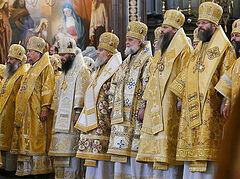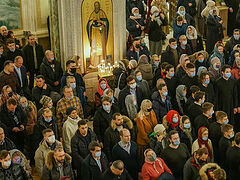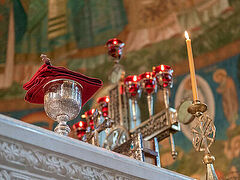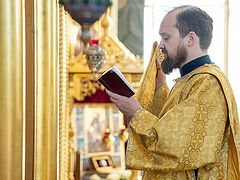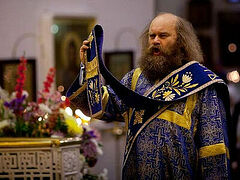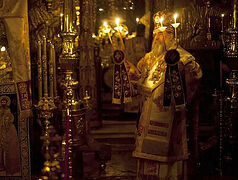We continue to examine the text of the Divine Liturgy. Last time, we spoke about the petition that includes a prayer for the bishop, the priesthood, the diaconate, every sacred rank, and all the people. In response to this petition, the choir sings: “Lord, have mercy,” after which the deacon exclaims: “For this city, every city and country and the faithful that dwell therein, let us pray to the Lord.”
One saint of the second century, whose name remains unknown, beautifully expressed himself about Christians in an epistle to a certain Diognetus: “Christians are strangers to everything in this world, but at the same time, they lovingly pray for everything around them—for the city and country where they live.” By their prayers, Christians attract the blessing of God to wherever they are.
The Church prays, “for this city, for every city” where the Divine Liturgy is celebrated. “City” here means everything in it altogether: the place, the buildings, the residents with their way of life. Such a petition reveals the character of the Church and the moral principle it instills in us faithful to not be indifferent to the place where we live. That is, we mustn’t be indifferent to whether everything is in order in our house, our city, and in the whole world. We should take an interest in it; we should want everything to be good in our city, that God’s blessing might be upon it, that legal order and prosperity might reign in it, that its inhabitants might be happy.
Think of the story in the Book of Genesis about Sodom and Gomorrah. By the multitude of their sins, the residents of this city retreated, withdrew from God, depriving themselves of the covering of Divine grace, which brought a terrible calamity upon their cities. Before Sodom and Gomorrah were destroyed by brimstone and fire, there was the famous dialogue between God and the Righteous Abraham. Abraham asked God:
“If a hundred righteous remain in the city, wilt Thou destroy it?”
God answered:
“No, if there are a hundred righteous, then for the sake of this one hundred, I shall not destroy the city.”
And Abraham realized that he had proposed too high a number:
“And if there are fifty?”
“If fifty are found, I shall not destroy the city for the sake of this fifty.”
“Forgive me, and if there are twenty-five?” And Abraham dropped the number a few more times: “And if there are twenty? Fifteen? Ten?”
However, as we know, there weren’t even ten righteous to be found in Sodom and Gomorrah.
An amazing dialogue! What does it teach us? It shows that the righteous are a kind of “receptacle” of God’s blessings. They attract Divine grace to the place where they live, thanks to which this place itself is sanctified and is kept by God. When the grace of God abides with us and covers us, then undoubtedly all the circumstances of our life take a much better turn. Of course, it doesn’t mean the inhabitants of places where certain calamities, natural disasters, earthquakes, and the like happen are some kind of sinners or that they don’t pray for their city. There are many holy cities where devastating earthquakes, fires, and other disasters have often occurred.
So, we Christians are obliged to pray for our city and for its authorities regardless of whether we like them or not; whether they belong to the party we like or not. We must pray for our leaders who stand at the helm of state and public power. Of course, these people need enlightenment from God and Divine help to do good works for the good of the people and the country.
This is the moral principle that the Church instills in us. You can’t say: “It’s not my hometown, I’m not going to pray for it,” or: “I don’t like this city—why should I pray for it? Let it crash to the ground—I don’t care about it at all.” Since we live here, we play for this place. We love it as much as we love our home, as much as we love everything around us. We don’t love just our own city, but every city, every country. Our love must extend to every place on the face of the earth, to every place of the Lord’s dominion (cf. Ps. 102:22). As soon as we realize that the world we live in is the creation of God and that God created it so wonderfully and beautifully, desiring to show us His love, then we’ll love this world, we’ll love our city and everything in it, and we’ll pray for all of it. Man must cultivate such a feeling of love within himself. It makes him closer and friendlier to everything that happens around him, and doesn’t allow him to remain indifferent to what happens in his city, country, and the whole world.
In becoming indifferent to everything around him, man gradually becomes indifferent to himself. Then he begins to spiritually degrade. This is why we can find so many people today who are suffering from alcoholism or drug addiction. It all can start from the fact that these people are indifferent to their own room. You go in and you see that the lamp is upside down, one shoe’s been tossed onto the bookshelf while the second landed somewhere else. That’s where it starts. If you want to find out if everything’s okay with someone—mentally, psychologically, and even spiritually—check out where he lives. No matter how strange it may seem, you can learn everything about a man from his home. If you’re indifferent to your home, it’s a bad sign that something’s not right with you, unless you’re a great ascetic like those of the desert who for the sake of spiritual podvig neglected all things in general. However, hardly any of us have reached such a level of spirituality. Therefore, such indifference doesn’t do us any good. Of course, I’m not saying it’s good when someone is manic from morning till evening for days on end, washing and cleaning something in their house, and shouting that people mustn’t dare step on the newly washed floor. That’s not what we’re talking about now.
I can assure you that all the modern saints I knew were extremely orderly people. Many of them lived in miserable hovels, in utter poverty—you can’t even describe their poverty—but still, they were very tidy.
I remember our ever-memorable Elder Joseph of Vatopedi. He was a simple, illiterate man. Wise, virtuous, and holy, he spent many years with Elder Joseph the Hesychast in the caves. However, when you entered his cell, you always saw everything in order. The tiny knife he used to cut paper and open envelopes was always in its place. Here he had a pen, there some sheets of paper. It was unthinkable to come into his cell and find a mess. The Elder knew where everything was, and he could reach out his hand in the dark, without a light (we had no electricity—we used kerosene lamps), and grab the knife, because it was always in the same place. Not here or there, but in the same place. Year after year for so many years—everything exactly in its place. I can see the Elder’s cell before me: his clothes, blanket, boots… His shoes—the pair always stood together next to his bed. The little rug he did prostrations on—rolled up in the corner of his cell.
Once, when I was still a novice and had the obedience of being in charge of the guest house, some pilgrims came—a group of guys. Elder Joseph came to the guest house and looked at one of the two rooms where the guys had stayed—oh-ho-ho! Blankets, sheets, and pillows all over the place. After that, the Elder told us: “How can someone acquire the grace of God when he can’t even make the bed? What, was there some battle here last night? There was a hole in the blanket, one slipper was here and the other over there—but come on, they only spent one night here…” Elder Joseph himself was very tidy.
I often accompanied him on trips. Once we went to Russia, where the Elder was sent as a representative of Vatopedi. We stayed in a hotel, in one large room. Every morning, the Elder would start cleaning—the dishes, the toilet—everything.
“Geronda, the maids will come and do all that.”
“How? Are we going to leave a mess behind us?”
We left the hotel with the room completely clean, ready for the next guests. There was never a time when the Elder didn’t get up and put everything in order.
St. Paisios was the same way. He had nothing in his poor kallyva. When he had to write something, he would sit down on a small stool, put a tablet on his lap, take a pen and some paper from a crevice in the wall, and write on the tablet. His bed was like a coffin. Instead of a lamp—a candle. Utter poverty. But at the same time, he was a tidy person. You’d never find a mess there.
Therefore, when you see some kind of mess in your children’s room, you should be concerned. You should understand that something’s wrong in their spiritual world. Of course, there may be a certain indifference and insensitivity here: The children are used to their mother doing everything for them, even bringing them milk in bed (and she does wrong if she brings it to them, because it only brings them harm!). You shouldn’t do that, but teach the children to get up themselves, make the bed, wash themselves, comb their hair, eat breakfast, and so on. But the main thing is that we all have to learn to love the place where we live, even if it’s not our permanent place of residence: Today I’m staying here, and tomorrow there. The fact that I’m leaving here tomorrow doesn’t mean I can just break everything here. So, external disorder, indifference, and lack of respect for one’s place are signs of spiritual disorder; signs that the person is having some kind of internal spiritual difficulties. When everything is well organized in your soul, then you will have external order as well. It can’t be otherwise.
Love your city and pray for it, wanting everything to be good for its residents; rejoice when something good happens in your city; don’t be indifferent to your place. When you care about the smallest and simplest things, then you’ll be attentive to bigger and more significant things. When you’re glad, for example, about the new hospital building, the nice new road, when you love your city, then you’ll naturally start loving all other cities, and rejoice and thank God for every place on earth. Then your life will also become interesting and joyful—not boring and listless.
A symptom of our time is spiritual anorexia. Physical anorexia manifests itself in that the person doesn’t have any appetite—they don’t want to eat anything at all. Mental and spiritual anorexia is manifested in that nothing interests, touches, occupies, gladdens the person; he’s completely indifferent to everything, whether things are good or bad for him.
Many people nowadays have a drive to destroy everything around them. There are people who openly don’t want things to be good in their city. Let’s say they find a clean white wall somewhere—they’ll definitely go and write shameful things, swear words all over it. For what? Just to ruin the wall. There’s even a saying: “A white wall is a piece of paper for a fool.”
All of this testifies to a lack or the absence of a spirit of gratitude, which the Church cultivates in our hearts with the help of the Divine Liturgy. The Liturgy embraces everything—the highest spiritual things, the Kingdom of Heaven, of which it’s said: For here have we no continuing city, but we seek one to come (Heb. 13:14)—so is our present fatherland, our city, our place, which we honor, love, bless, sanctify, defend, and pray for. Look, when God created man, He didn’t place him in some wasteland, but settled him in the beautiful Garden of Paradise—to dress and keep Paradise (Gen. 2:15). It’s only after that the fall of Adam and Eve that thorns and thistles appeared, barren lands that man works with great difficulty and sweat.
Thus, a man’s spiritual reality is revealed in simple, everyday things: in how he treats his home, his clothes, his external appearance, the things around him; how he speaks with others, how he behaves at home with his family or at work with his co-workers.
I remember one elder from the Holy Mountain who said: “When you use a tool for some handicraft, you should thank it when you’re done.” I see how you’re smiling at what he said. But what do these words from the elder mean? They testify to the fact that he had great respect for everything around him. And our Elder Joseph told us that when he carved prosphora seals, as soon as he sat down and picked up a knife, he immediately felt great grace, from which noetic prayer began to work within him. All he had to do was pick up a tool… This happened to him because he treated his tools carefully, with respect. He took care of them, sharpening them, cleaning them, and putting them back in their spot in the drawer.
I remember one young man—a very virtuous Christian, ascetically inclined. He worked in a cafeteria. When customers would come, he would offer them coffee, juice, and other things. He had a tray that he carried everything on. He loved this tray so much that when he had to change jobs, he asked the boss to give it to him. It was a simple, cheap tray—maybe $2 today. I asked this young man:
“What do you need it for?”
“This tray means a lot to me,” he said. “Thanks to it, I found the grace of God.”
That’s what he told me, and I certainly believe him: Thanks to this tool that he used to serve others with love, he found grace, he improved himself, he succeeded, and spiritually advanced.
None of this would have happened with this young man if he had treated the tray with disdain or hatred, as some children behave at school: They tear up their notebooks, books, they kick their bags, they break windows, they break their desks. What does such behavior mean? It speaks to the state of their souls: These children have no relation to the things around them—to the school, their class, the teacher—as to something sacred. It’s very bad when a man doesn’t love what he does, what he uses, what he has.
When I lived at New Skete on Mt. Athos, I had the obedience of sewing for several years. One was the cook, another in charge of the guest house, and I did the sewing. I worked at a mechanical sewing machine with a foot pedal—as I said, we didn’t have electricity. (Just don’t think of buying me a sewing machine for the Metropolis—I have absolutely no time for sewing now!) What can I tell you? As soon as I sat down at the sewing machine—how wonderful I felt! There are no words to explain and describe the feeling that filled my soul then! Sewing is a great work when it’s done with prayer and love. We loved our tools, our things. Our elders taught us that. We didn’t have such a disposition at first, when we had just come from the world. Respect for things seemed like a joke to us. We were indifferent to everything. But then we saw our fathers, elders, ascetics—what kind disposition, what love and care they had for their tools and things, even if it was just a bag or a box.



